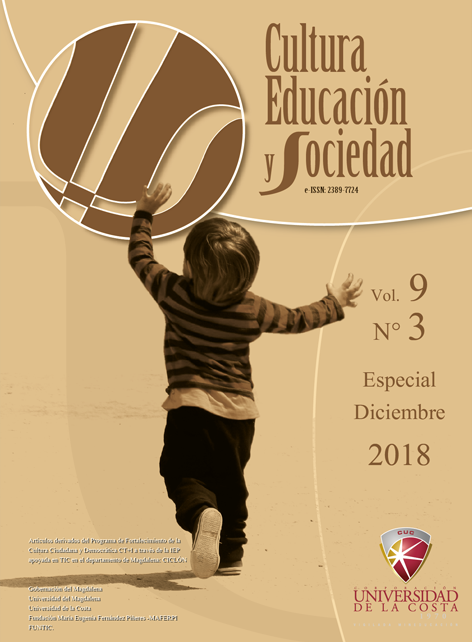Improve school coexistence through reading through research as a pedagogical strategy
DOI:
https://doi.org/10.17981/cultedusoc.9.3.2018.65Keywords:
school coexistence, reading, research as a pedagogical strategy (IEP)Abstract
The bad coexistence that lives in the educational institutions has become a disturbing factor of the school coexistence; It is considered that it is necessary to intervene to achieve a significant change within the classrooms. The objective of this article is to improve school coexistence by using reading as a pedagogical strategy (IEP); A qualitative study was carried out under the model of descriptive research, a population made up of thirty-eight (38) students of fourth (4) grade of primary school of the Third Mixed educational institution, José Antonio Galán. During the investigative process, techniques and instruments were applied such as direct observation, field diaries; The research managed to capture the attention of the students by reducing the bad coexistence inside and outside the classroom and increasing the use of free time using reading as a strategy to strengthen research.
Downloads
References
Arias, F. G. (2006). El Proyecto De Investigacion Introduccion A La Metodologia Cientifica. Caracas-Venezuela: Episteme, C.A.
Ausubel, D. (2002). Adquisicion Y Retencion Del Conocimiento: Una Perspectiva Cognitiva . Barcelona-España: Paidos Iberica.
Borzonen, A. M. (2005). La Lectura De Cuentos En El Jardín Infantil: Un Medio Para El Desarrollo De Estrategias Cognitivas Y Lingüísticas. Scielo, 192-209.
Caballero, G. M. (2010). Convivencia Escolar. Un Estudio Sobre Buenas Prácticas. Dialnet , 154-170.
Daniel, I. N. (2003). La Convivencia Escolar: Una Tarea Necesaria, Posible Y Compleja. Cei, 1-11.
Furlan, A. (2006). Problemas De Indiciplina Y Violencia En La Escuela. Revista Mexicana De Investigacion Educativa, 631-639.
Gomez, N. A. (2005). Violencia E Institución Educativa. Revista Mexicana De Investigacion Educativa, 693-718.
Hernandez Sampieri Roberto, F. C. (2010). Metodologia De La Investigacion . Mexico Df: Mcgraw Hil.
Ianni, N. (2003). La Convivencia Escolar: Una Tarea Necesaria, Posible Y Compleja. Oei, 1-11.
La Lectura De Cuentos En El Jardín Infantil: Un Medio Para El Desarrollo De Estrategias Cognitivas Y Lingüísticas. (2005). Scielo, 192-209.
Marquez, C. J. (2017). Plan De Intervención Cognitivo Conductual Para Modificar Conductas Agresivas En Niños Y Niñas De 7 Años. Ecuador: Universidad Tecnica De Machala.
Medina Rivilla, A. C. (2010). La Prevención De La Violencia: La Implicación De La Comunidad Educativa Para Evitar Situaciones De Acoso Escolar. Revista De Pedagogia, 93-107.
Murillo Estepa, P. B. (2009). Las Percepciones Del Clima Escolar Por Directivos, Docentes Y Alumnado Mediante El Empleo De «Redes Semánticas Naturales». Su Importancia En La Gestión De Los Centros Educativos. Revista De Educacion , 375-399.
Ortega Ruiz, R. R. (2009). Protagonismo De La Atención A La Convivencia En La Prevención De La Conflictividad Y La Violencia Escolar. Informacion Psicologica, 4-14.
Palomino, L. M. (2009). Los Problemas De Convivencia Escolar: Percepciones, Factores Y Abordajes En El Aula. Revista De Investigaciones Unad, 199-221.
Patricia Cid H., A. D. (2008). Agresión Y Violencia En La Escuela Como Factor De Riesgo Del Aprendizaje Escolar. Scielo, 21-30.
Valls, R. S. (2008). Lectura Dialógica: Interacciones Que Mejoran Y Aceleran La Lectura. Diposit Digital, 71-81.
Valverde Riascos, Y. D. (2014). Lectura Y Escritura Con Sentido Y Significado, Como Estrategia De Pedagógica En La Formación De Maestros. Fedumar Pedagogia Y Educacion.
Downloads
Published
How to Cite
Issue
Section
License
Copyright (c) 2018 CULTURA EDUCACIÓN Y SOCIEDAD

This work is licensed under a Creative Commons Attribution-NonCommercial-NoDerivatives 4.0 International License.
![]()
Creative Commons 2020 CULTURA EDUCACIÓN Y SOCIEDAD
This article is under international license Creative Commons Reconocimiento-NoComercial-SinObrasDerivadas 4.0.
The published articles are the sole responsibility of their authors and do not necessarily reflect the opinions of the editorial committee.
CULTURA EDUCACIÓN Y SOCIEDAD respects the moral rights of its authors, who assign to the editorial committee the patrimonial rights of the published material. In turn, the authors inform that this work is unpublished and has not been previously published.
All articles are under a:
Licencia Creative Commons Atribución-NoComercial-SinDerivadas 4.0 Internacional.
![]()


 English
English
 Español (España)
Español (España)




_12.53_.27_p_. m_._3.png)





_12.57_.35_p_. m_._3.png)
_12.50_.37_p_. m_._3.png)



